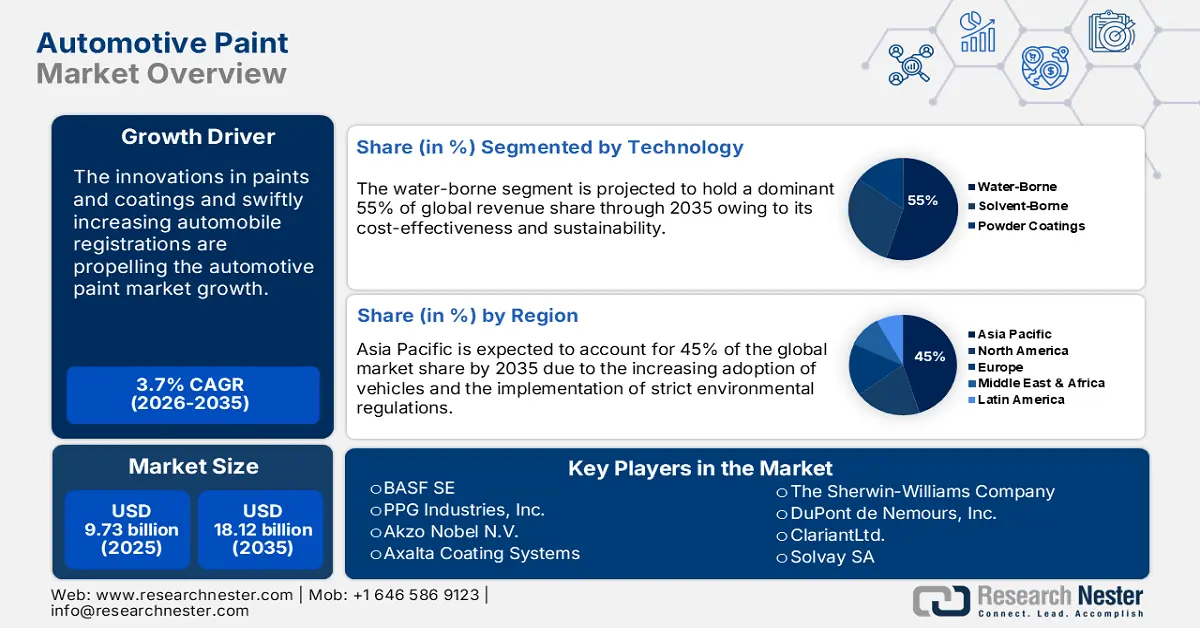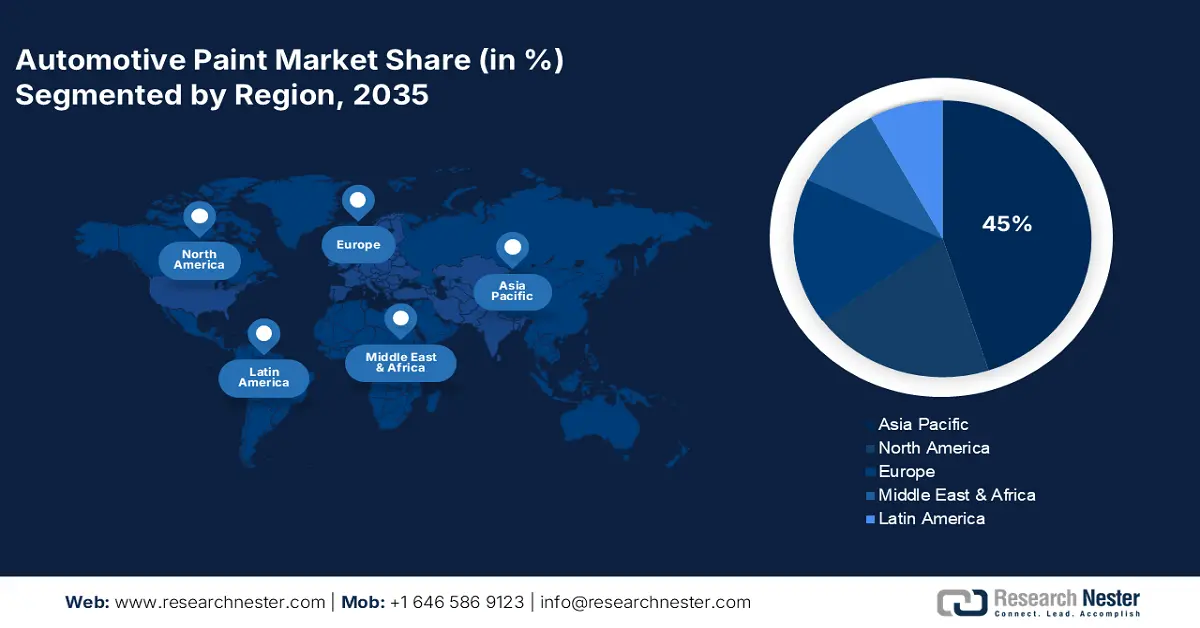Automotive Paint Market Outlook:
Automotive Paint Market size was over USD 25.23 billion in 2025 and is poised to exceed USD 36.28 billion by 2035, witnessing over 3.7% CAGR during the forecast period i.e., between 2026-2035. In the year 2026, the industry size of automotive paint is estimated at USD 26.07 billion.

Increasing vehicle production, the rise of consumer awareness, and advancements in technology of painting are estimated to boost the growth of the market size during the forecast period. The covid impact has decreased the growth since 2019 and again boosted in 2021. In 2021, more than 9 million motor vehicles were produced in the U.S., while over 78 million vehicles were manufactured across the world. Additionally, rising personal income of individuals, improvement in lifestyle standards, and increasing investments in the development of automotive paints are expected to increase growth opportunities for the market.
The upsurge in innovative and eco-friendly automotive paints and demand for the aesthetic and glossy look is expected to boost the growth of the market trends during the forecast period. In 2017, the value of total automotive paints produced was around USD 8.5 billion globally. This is estimated to increase to over USD 10 billion by 2025. The resale value of old cars is increased with the colors of paint. Textured paints are a new trend to bring owners a tactile and visual experience. Besides, the increasing concern of people on health issues and adverse reactions caused by inhalation of volatile organic compounds used in solvent-based paints rise the demand for eco-friendly paints anticipating the escalation in the growth of the market.
Key Automotive Paint Market Insights Summary:
Regional Highlights:
- The Asia Pacific automotive paint market is expected to achieve a 45% share by 2035, driven by the high production of electric vehicles in the region.
Segment Insights:
- The water-borne technology segment in the automotive paint market is expected to hold the largest share by 2035, driven by growing environmental concerns and high demand for eco-friendly automotive paint.
Key Growth Trends:
- Growing Demand for Innovative and Eco-Friendly Paints
- Rise in Global Automobile Production Owing to Rising Disposable Income
Major Challenges:
- Emission of Volatile Organic Compounds
- Rapid Change in Consumer Preference
Key Players: 3M, BASF SE, PPG Industries, Inc., Akzo Nobel N.V., Axalta Coating Systems, The Sherwin-Williams Company, Kansai Paint Co., Ltd, Nippon Paint Holdings Co., Ltd, DuPont de Nemours, Inc., ClariantLtd., Solvay SA.
Global Automotive Paint Market Forecast and Regional Outlook:
Market Size & Growth Projections:
- 2025 Market Size: USD 25.23 billion
- 2026 Market Size: USD 26.07 billion
- Projected Market Size: USD 36.28 billion by 2035
- Growth Forecasts: 3.7% CAGR (2026-2035)
Key Regional Dynamics:
- Largest Region: Asia Pacific (45% Share by 2035)
- Fastest Growing Region: Asia Pacific
- Dominating Countries: China, United States, Germany, Japan, South Korea
- Emerging Countries: China, India, Japan, South Korea, Thailand
Last updated on : 8 September, 2025
Automotive Paint Market Growth Drivers and Challenges:
Growth Drivers
- Growing Demand for Innovative and Eco-Friendly Paints – The automotive manufacturing industry is witnessing a high demand for innovative and eco-friendly paints, which is a key growth driver for the growth of the market during the forecast period. Eco-friendly water-based paints are developed with less toxicity of lead to reduce the exposure of repainting workers to metals. According to various research, eco-friendly paints with lead concentrations ranging from 0.25 μg/g to 107,928 μg/g are being increasingly manufactured, as a result of this shift amongst consumers.
- Rise in Global Automobile Production Owing to Rising Disposable Income –The robust growth of the automotive industry is the key factor for the growth of the market size during the forecast period. As of 2020, the global light-duty vehicle fleet comprises over 1 billion vehicles.
- Higher Expenditure for Vehicle Maintenance to Achieve an Elegant and Classy Look –People are spending more to keep their vehicles in good condition. The expenditure on maintaining a vehicle raised to more than USD 2,000 in 2019 from 1000 in 1997 i.e., about 85% with a 3% growth per year. Moreover, the demand for a classy and elegant look for the vehicle is also estimated to boost the market growth. New colors are developed such as dark seltzer, redolent red, and abstraction blue to give depth and class to the cars.
- High Use of Polyurethane Paints to Increase Durability and Prevent Rusting –The high durability standards of solvent-based polyurethanes are replaced by water-based polyurethanes to protect the environment and decrease solvent exposure. The good substrate adhesion, abrasion resistance, toughness, and protection from corrosion increased the demand for use of polyurethane paints market. Urethane resins contribute to 20% of the demand for resins across the globe.
- Growing Resale Market in Automotive Industry Owing to Low Budget – With the decreased price of new cars in resales and growing resale platforms, consumers are more interested to get used cars. In fact, the value of used car sales was approximately USD 1.25 trillion in 2020.
Challenges
- Emission of Volatile Organic Compounds
- Rapid Change in Consumer Preference
- Adverse Health Issues in Painters-Long-term exposure to solvent fumes released from paints can cause headaches, dizziness, nausea, and breathing issues such as asthma. These paints can be fatal where the ventilation space is very less or absent. The high presence of volatile organic compounds leads to psychological and neurological problems, cancer, fertility problems, and skin irritations in painters working for longer hours. The prevalence of health issues leads to employee shortage decreasing market growth.
Automotive Paint Market Size and Forecast:
| Report Attribute | Details |
|---|---|
|
Base Year |
2025 |
|
Forecast Period |
2026-2035 |
|
CAGR |
3.7% |
|
Base Year Market Size (2025) |
USD 25.23 billion |
|
Forecast Year Market Size (2035) |
USD 36.28 billion |
|
Regional Scope |
|
Automotive Paint Market Segmentation:
Technology Segment Analysis
The global automotive paint market is segmented and analyzed for demand and supply by technology into water-borne, solvent-borne, and powder coatings. Out of these, the water-borne segment is anticipated to hold the largest market size by the end of 2035. Water-borne paints are cost-efficient and inexpensive, which upsurges the growth of the market during the forecast period. Moreover, the growing environmental concerns and high demand for eco-friendly automotive paint are estimated to boost the market during the forecast period. In a survey, close to 75% of the people were environmentally aware and said they were more likely to make eco-friendly changes in their lifestyle.
Our in-depth analysis of the global automotive paint market includes the following segments:
|
By Coating |
|
|
By Texture |
|
|
By Technology |
|
|
By Resin |
|
|
By Channel |
|
|
By Vehicle |
|

Vishnu Nair
Head - Global Business DevelopmentCustomize this report to your requirements — connect with our consultant for personalized insights and options.
Automotive Paint Market Regional Analysis:
Asia Pacific Market insights
Asia Pacific industry is expected to hold largest revenue share of 45% by 2035. The growth is attributed to the high production of electric vehicles in the region. The growing consumer preference for rich texture, aesthetic finish, and glossy look is estimated to boost the market during the forecast period. The growth in sales of electric cars is twice in 2021 with about 7 million including fully electric and plug-in hybrids. In 2021, China has tripled the sales of electric cars with 3 million units, contributing to half the sales across the globe.

Automotive Paint Market Players:
- 3M
- Company Overview
- Business Strategy
- Key Product Offerings
- Financial Performance
- Key Performance Indicators
- Risk Analysis
- Recent Development
- Regional Presence
- SWOT Analysis
- BASF SE
- PPG Industries, Inc.
- Akzo Nobel N.V.
- Axalta Coating Systems
- The Sherwin-Williams Company
- Kansai Paint Co., Ltd
- Nippon Paint Holdings Co., Ltd
- DuPont de Nemours, Inc.
- ClariantLtd.
- Solvay SA
Recent Developments
-
3M innovation of the robotic paint repair system has received the SURCAR award. The imperfections of paint on vehicles are detected manually which is labor intensive and time-consuming process that is now replaced by Finesse-it of 3M.
-
BASF SE has developed many variations in color options for automotive color trends collection 2021-2022.
- Report ID: 278
- Published Date: Sep 08, 2025
- Report Format: PDF, PPT
- Explore a preview of key market trends and insights
- Review sample data tables and segment breakdowns
- Experience the quality of our visual data representations
- Evaluate our report structure and research methodology
- Get a glimpse of competitive landscape analysis
- Understand how regional forecasts are presented
- Assess the depth of company profiling and benchmarking
- Preview how actionable insights can support your strategy
Explore real data and analysis
Frequently Asked Questions (FAQ)
Automotive Paint Market Report Scope
Free Sample includes current and historical market size, growth trends, regional charts & tables, company profiles, segment-wise forecasts, and more.
Connect with our Expert
Copyright @ 2026 Research Nester. All Rights Reserved.




